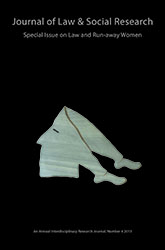Saraiki Proverbs Related to Runaway Women
DOI:
https://doi.org/10.7146/nnjlsr.v0i4.111095Abstract
The use of proverbs in the Saraiki language shows different male attitudes towards women especially ‘the runaway’. This research-based study is meant to highlight Saraiki proverbs related to runaway women and the negative attitudes they out forward declaring them careless and disobedient. There is a presumption that Saraiki-speaking women are hard working and less demanding. These proverbs present an ideal of Seraiki women as being very tolerant to the cruelties and hardships they face in the name of honor. Proverbs are mostly considered to reflect this taken-for-granted wisdom. This study will explore how these proverbs are deployed and what kinds of consequences they have both positive or negative.
References
Granbom-Herranen, Liisa (2010) Women’s Place in Finnish Proverbs from Childhood: Electronic Journal of Folklore, pp 95-110.
Helen, Yitah (2009) Fighting with proverbs: Kasena Women’s (Re) Definition of Female Personhood through Proverbial Jesting, Research in African Literatures, Fall 2009, Vol. 40 Issue 3, pp. 74-95.
Hussein, Jeylan Wolyie, (2009) A Discursive Representation of Women in Sample Proverbs from Ethiopia, Sudan, and Kenya. Research in African Literatures. Fall, Vol. 40 Issue 3, pp. 96-108.
Kerschen, Lois (2000) Proverbs about Women: From the Pacific Northwest and California. In:California History, Vol. 79, No. 1, Literature and the Arts in California and the Pacific Northwest, University of California Press in association with the California Historical Society Stable, pp. 62-69.
Madumulla, J.S. (1995) Proverbs and Saying: Theory and Practice. Dares-Salaam
Mughal, Shaukat. (1992) Siraiki Akhaan, First Vol. 1st Ed. Jhok Publishers and Printers Multan, Pakistan
Mughal, Shaukat. (2005) Siraiki Akhaan, First Vol. 2nd Ed. Jhok Publishers and Printers Multan, Pakistan
Mughal, Shaukat. (2009) Siraiki Akhaan, First Vol. 3rd Ed. Jhok Publishers and Printers Multan, Pakistan
Ndungo, Catherine (2002) Social Construction of Gender, with Special Reference to Gikuyu and Swahili Proverbs, Fabula, 2002, Vol. 43(1), pp.64-74
Downloads
Published
How to Cite
Issue
Section
License
Counting from number 12 (2022), articles published in NNJLSR are licensed under Attribution 4.0 International (CC BY 4.0). Readers are allowed to copy and redistribute the articles in any medium or format, to adapt and revise the articles, and use the articles for commercial purposes, provided that the readers give appropriate credits.
No Creative Commons licenses are applied on articles in number 1 (2009)-11 (2021). All rights reserved by the authors. Readers are allowed to download, read, and link to the articles published in volume 1 (2009)-11 (2021), but they may not republish or redistribute these articles without permission of the authors.

